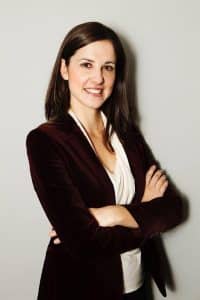Posted on: 08.10.2024
Our Associate Partner, Barbara Ozanon, recently sat down with Carlota Gómez de la Hoz, to talk about career milestones, the role of DEI in comms, and her advice for others.
Carlota is Head of International and Regional Communications and DEI Lead within the communications function at leading multinational company Bayer. With a career spanning over 20 years in corporate communications, Carlota brings a wealth of experience in stakeholder engagement, crisis management, and driving innovative strategies in the dynamic field of global communications.
Read the full interview:

Can you talk to us about your career so far? What key milestones are you most proud of?
In 2012, I was promoted to Head of Communications and Corporate Affairs for Bayer in Iberia before turning 30. That was definitely a key milestone personally, but also for the company’s function in Spain. It was a beautiful journey where I had to bring all divisions together, build an integrated 360 strategy for the first time.
Another significant milestone was managing communications around the acquisition of Monsanto. It was extremely transformational for the company business-wise, reputation-wise, and culture-wise. I led a 360-degree country stakeholder engagement plan to explain why this was important and how we would handle it appropriately, which was a titanic effort, but an extremely rewarding one. After this, I was promoted to Head of Communications for EMEA Region for the agriculture division.
What personal attributes do you think have contributed to your success?
I’m very passionate about what I do. I really believe in the transformative power of communications and public affairs. And I think that passion is important.
Then there’s courage. I’m a courageous person that doesn’t shy away from putting across my point of view and making tough calls when they’re needed, which I think is a positive thing.
And finally, I think people management skills are often underestimated, but so important. That’s why I strive to be empathetic, honest, and humble. These elements definitely define me, but they’re also a key part of how I manage teams.
How do you approach diversity and inclusion in your function?
I have an activist heart. I’ve been advocating for social equality since I was a teenager. So I’m proud to say we’ve implemented several measures around diversity and inclusion. We conducted analyses of our working environment, set up a voluntary inclusion and diversity team, and implemented training on unconscious bias and inclusive leadership, among other activities in a comprehensive action plan.
We also set targets for involving colleagues from different markets in decision-making processes, not just implementation. We’ve seen significant improvements in how our people perceive our inclusivity and diversity. It’s a never-ending journey, but we’ve achieved quite a lot.
Why is diversity and inclusion so critical in communications?
Our function is meant to connect the company with society. If we’re not able to understand multiple perspectives – cultural, religious, political, or economic – we’re not going to be effective. We’ll just communicate to one part of the population, and our company can’t afford that when we’re operating in hundreds of countries.
What do you think leaders can do to drive diversity, equality and inclusion within the communications industry?
You can start by being sensitive, empathetic, and actually going out of your way to become aware of the issues. I believe unconscious bias training should be mandatory. You might think you don’t have a problem in your company specifically, but when you take training like this it really opens your eyes to how important DE&I still is.
What advice would you give to women aspiring to leadership roles?
Build networks. It’s important to have a good network that sustains and supports you, where you can exchange ideas and get advice. Partner with other women, but also with men. Don’t shy away from being vocal.
I would also encourage women to try to find an environment and company culture that supports gender diversity and has a strategy to support women in their careers. It’s never perfect, but some companies have better environments than others.
How can society foster gender diversity in leadership roles?
We need to start with culture and education, addressing how we build gender roles from childhood. It’s crucial that we get it right from the beginning, making things more generic.
We also need to showcase and give visibility to women’s leadership examples because we all need references. Society should put structures in place that truly support equality, like equal parental leave for men and women.
And finally, what future talent management trends do you foresee for the communications industry?
Companies that can’t connect their purpose with personal purpose will have a difficult time. New generations are interested in more than just a salary. They want to connect their personal interests with the company’s interests and make a true impact.
Flexibility is also super important, in terms of job location, how you organize your workday, and presence in the office.
Lastly, we need to understand the impact of artificial intelligence on our function. In the future, we’ll probably need more people taking decisions rather than just creating content. We need to prepare people to take more decisions than they have in the past.

 enquiries@hansonsearch.com
enquiries@hansonsearch.com